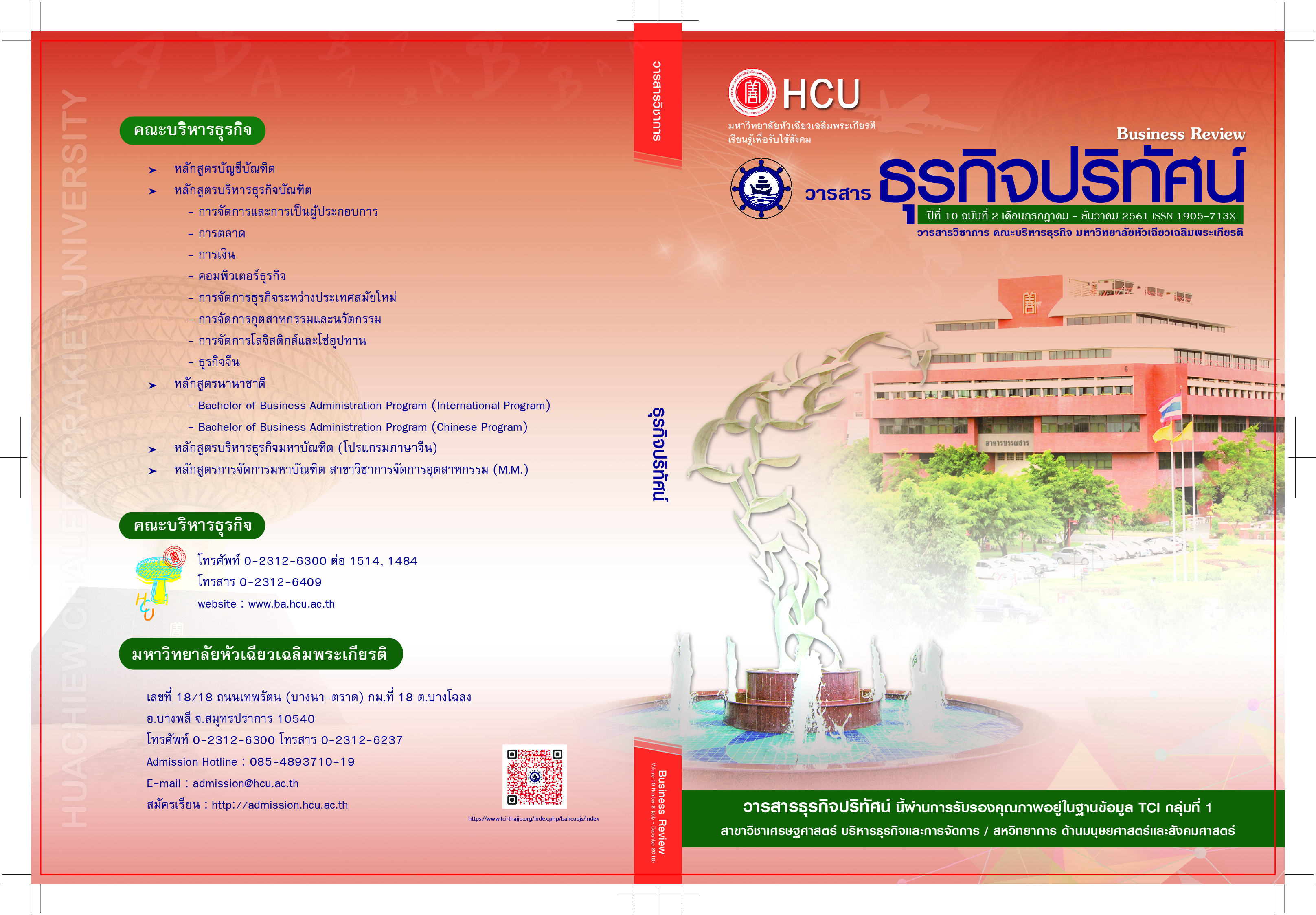Cultural Tourism Development Strategy of Phuchaosamingprai Community in Samutprakarn Province to be the Cultural Tourism Area
Keywords:
Development Strategy, Tourism, Cultural tourism areaAbstract
The purposes of this research were: 1) to study situations and needs of cultural
tourism of Puchaosamingprai community. 2) to develop the strategies of cultural tourism
development strategies of Puchaosamingprai community. The methodology of this research
were mixed of policy research and Ethnographic Delphi Futures Research. The data were
collected by in-depth interview form eighteen informants and twenty experts assessed the
importance and appropriateness of strategies, tactics, goals and procedures. The results
showed as following: (1) situation and need of tourism for Puchaosamingprai community
had tourist area could develop for cultural tourism by supporting community community
participation for development. results showed as following: 1) situation and need of tourism
for Puchaosamingprai community had tourist area could develop for cultural tourism by
supporting community community participation for development. 2) Cultural Tourism
Development Strategy of Phuchaosamingprai Community in Samutprakarn Province through
the vision was to promote cultural tourism area of Puchaosamingprai community by
community participation. There were three strategies, consisting of: 1) improve and
develop tourist area in the community. Both in architecture, culture and life of community.
2) to support community stakeholder by communities participation for cultural tourism
development. 3) to develop marketing strategies and publicity to attract both domestic and
foreign tourists to attention to tourism in the community. The strategies based on expert
evaluation found that the strategies are appropriate.
References
กรุงเทพมหานคร : กระทรวงการท่องเที่ยวและกีฬา.
กระทรวงการท่องเที่ยวและกีฬา. (2559). แผนพัฒนาการท่องเที่ยวแห่งชาติ พ.ศ. 2560 ถึง 2564.
กรุงเทพมหานคร : กระทรวงการท่องเที่ยวและกีฬา.
คนึงภรณ์ วงเวียน. (2554). การพัฒนายุทธศาสตร์การท่องเที่ยวเชิงนิเวศอย่างยั่งยืน กรณีศึกษาเกาะเสม็ด
จังหวัดระยอง. วิทยานิพนธ์ปรัชญาดุษฎีบัณฑิต, มหาวิทยาลัยราชภัฎพระนคร.
วันชัย มีชาติ. (2550). การบริหารองค์การ. กรุงเทพมหานคร: จุฬาลงกรณ์มหาวิทยาลัย.
วิรัช วิรัชนิภาวรรณ. (2554). การบริหารจัดการและบริหารยุทธศาสตร์ของหน่วยงานภาครัฐ. กรุงเทพ-
มหานคร: Forepace publishing house.
เฉลียว บุรีภักดี. (2548). ชุดการศึกษาค้นคว้า รายวิชา 2553101 ทฤษฎีระบบและการประยุกต์ใช้ในการ
พัฒนา. กรุงเทพมหานคร : มหาวิทยาลัยราชภัฏพระนคร.
พิมพ์ระวี โรจน์รุ่งสัตย์. (2553). การท่องเที่ยวชุมชน. กรุงเทพมหานคร : โอเดียนสโตร์.
Alexandru, S., Rodica, P. & Gribmacea. (2015). Identifying cultural tourism potentials in Republic
of Moldova through cultural consumption among tourists. National Institute for Economic
Research.
Anna. L & Ivana. R. (2010). The role of heritage tourism in the Shetland Islands. International Journal
of Culture, Tourism and Hospitality Research. 4, 2: 118-129.
José G. Vargas-Hernández, (2012). Sustainable cultural and heritage tourism in regional development
of Southern Jalisco. World Journal of Entrepreneurship, Management and Sustainable
Development, Vol. 8 Issue: 2/3,pp. 146-161.
Marianna Sigala, D.L. (2006). Internaltional cultural tourism. Burlington: Elsevier.
Nur, I. M. R., & Saniah, A. Z., Syed, M. H. S. S. (2013). Between tourism and intangible cultural
heritage. ASEAN Conference. on Environment-Behaviour Studies Hanoi Architectural
University, Hanoi, Vietnam, 19-22 March 2013.
Saso K. & Naume M. (2012). Cultural tourism in Ohrid as a selective form of tourism development.
Service sector in terms of changing environment 2012.
Stufflebeam, Foley et al. (1971). Educational Evaluation and decision making. Itasca,IL: Peacock.
Downloads
Published
How to Cite
Issue
Section
License
All articles published in the Business Administration and Management Journal Review are copyrighted by the journal.
The views and opinions expressed in each article are solely those of the individual authors and do not represent those of Huachiew Chalermprakiet University or any other faculty members. Each author is fully responsible for the content of their own article. Any errors or issues found are the sole responsibility of the respective author.




